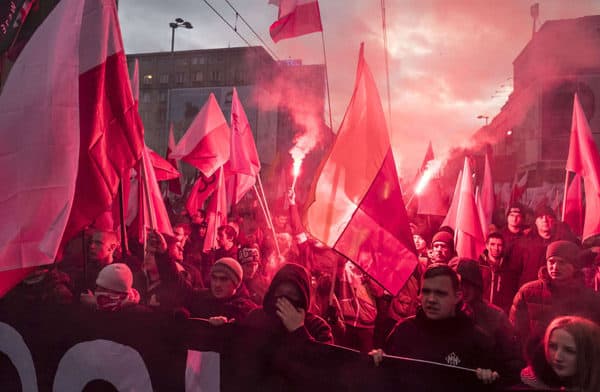‘White Europe’: 60,000 Nationalists March on Poland’s Independence Day
Matthew Taylor, Guardian, November 12, 2017
Tens of thousands of nationalist demonstrators marched through Warsaw at the weekend to mark Poland’s independence day, throwing red-smoke bombs and carrying banners with slogans such as “white Europe of brotherly nations”.
Police estimated 60,000 people took part in Saturday’s event, in what experts say was one of the biggest gathering of far-right activists in Europe in recent years.
Demonstrators with faces covered chanted “Pure Poland, white Poland!” and “Refugees get out!”. A banner hung over a bridge that read: “Pray for Islamic Holocaust.”
The march organised by far-right groups in Poland is an annual event originally to mark Poland’s independence in 1918. But according to Nick Lowles, from UK anti-extremism group Hope Not Hate, it has become an important rallying point for international far-right groups.
“The numbers attending this year seem to be bigger and, while not everyone on the march is a far-right activist or fascist, it is undoubtedly becoming more significant and is acting as a magnet for far-right groups around the world.”
Some participants marched under the slogan “We Want God!”, words from an old Polish religious song that the US president, Donald Trump, quoted during a visit to Warsaw earlier this year. Speakers encouraged attendants to stand against liberals and defending Christian values.
Many carried the national white-and-red flag while others held banners depicting a falanga, a far-right symbol dating to the 1930s. A demonstrator interviewed by state television TVP said he was on the march to “remove Jewry from power”.
Among the far-right leaders attending the march was the former English Defence League leader Stephen Lennon, better known as Tommy Robinson, and Roberto Fiore from Italy. It also attracted a considerable number of supporters of Poland’s governing conservative Law and Justice (PiS) party.
TVP, which reflects the conservative government’s line, called it a “great march of patriots”, and in its broadcasts described the event as one that drew mostly ordinary Poles expressing their love of Poland, not extremists.
“It was a beautiful sight,” the interior minister, Mariusz Błaszczak, said. “We are proud that so many Poles have decided to take part in a celebration connected to the Independence Day holiday.”
The march was one of many events marking Poland’s independence in 1918, when the country regained its sovereignty at the end of the first world war after being partitioned and ruled since the late 18th century by Russia, Prussia and the Austro-Hungarian empire.
A smaller counter-protest by an anti-fascist movement took place on Saturday where, although organisers tried to keep the two groups apart, nationalists pushed and kicked several women who had a banner saying “Stop fascism” and chanted anti-fascist slogans.
“I’m shocked that they’re allowed to demonstrate on this day. It’s 50 to 100,000 mostly football hooligans hijacking patriotism,” said a 50-year-old Briton, Andy Eddles, a language teacher who has been living in Poland for 27 years. “For me it’s important to support the anti-fascist coalition and to support fellow democrats, who are under pressure in Poland today.”
Earlier in the day, the president, Andrzej Duda, presided over state ceremonies also attended by the European council president, Donald Tusk, a former prime minister of Poland.
Tusk’s appearance comes at a time when Warsaw has been increasingly at odds with Brussels because of the PiS government’s controversial interference in the courts, large-scale logging in a primeval forest and a refusal to accept migrants. Relations between PiS and Tusk have been so tense that Poland was the only country to vote against his re-election as council president in March.

Credit Image: © BE&W via ZUMA Press















